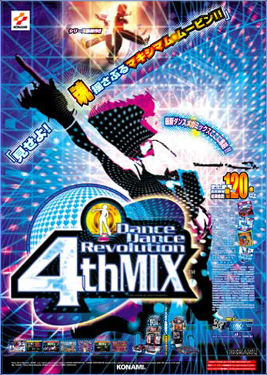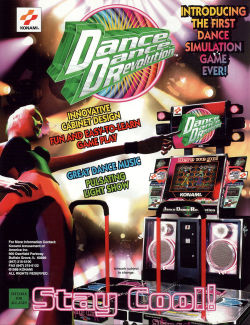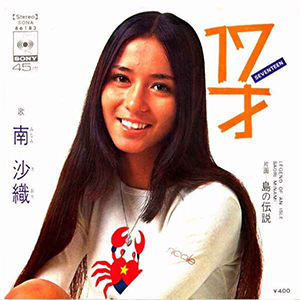Dance Dance Revolution (DDR) is a music video game series produced by Konami. Introduced in Japan in 1998 as part of the Bemani series, and released in North America and Europe in 1999, Dance Dance Revolution is the pioneering series of the rhythm and dance genre in video games. Players stand on a "dance platform" or stage and hit colored arrows laid out in a cross with their feet to musical and visual cues. Players are judged by how well they time their dance to the patterns presented to them and are allowed to choose more music to play to if they receive a passing score.
Dancing Stage is a series of music video games developed and published by Konami. It is a spin-off of Dance Dance Revolution for the European market as well as a few Japanese titles. Games were released for arcade, PlayStation, PlayStation 2 and Wii.
Riyu Kosaka is a Japanese pop singer and lyricist. She is best known as a member of the Konami-produced Japanese teen pop girl group BeForU.
DDRMAX Dance Dance Revolution 6thMix is the 6th game in the Dance Dance Revolution series of music video games. It was released in the arcades by Konami on October 19, 2001, and for the PlayStation 2 on May 16, 2002, in Japan. 6thMix contains a total of 42 songs, all which made their first arcade appearance on this release. 11 of these songs debuted in various console releases prior to 6thMix. All arcade songs from Dance Dance Revolution to Dance Dance Revolution 5thMix were removed in 6thMix, although many of the Konami originals from those games would later be revived in future arcade releases.

Dance Dance Revolution: Mario Mix, known in Europe as Dancing Stage Mario Mix, is a 2005 music video game developed by Konami and Hudson Soft and published by Nintendo for the GameCube. It is the first Dance Dance Revolution game to be released on a Nintendo video game console outside Japan.

Dance Dance Revolution 4thMix is the fourth game in the main Dance Dance Revolution series of music video games. It was released as an arcade game by Konami on August 24, 2000 in Japan. 4thMix features 136 songs, of which 37 are new songs available and 12 are new unlockables that require an operator code. Dance Dance Revolution 4thMix Plus is an update that unlocks these 12 songs without an operator code, while also adding 14 new songs of its own, for a total of 150 songs.

Dance Dance Revolution (DDR) is a music video game, developed by Konami, released in arcades on September 26, 1998, in Japan. Dance Dance Revolution is a unique game involving dance and rhythm that defined the genre. It involves timing and balance by having players use their feet instead of their hands like typical video games. In March 1999, the game was released for North American arcades, and for European arcades under the name Dancing Stage. Players and game critics were caught off-guard by the game's addictive qualities winning the new franchise many merits to its design.
Linnéa Handberg Lund, also known as Papaya and Miss Papaya, is a Danish musician. She has achieved Gold and Platinum status as a songwriter within Europe and Asia in the 2000s after her two albums released as an independent artist.
Desirée Sparre-Enger, mostly known by her stage name Bambee, is a Norwegian bubblegum dance singer from Nordstrand, Oslo. She was born in the Solomon Islands to a Grenadian mother and a Norwegian father. She used the name Bambee as a reference to her eyes, comparable to those of a deer. Originally she considered using the name Bambi but changed the spelling to avoid copyright issues. Several of her more popular songs, including "Cowgirl", "Seventeen" and "Bumble Bee", have appeared on the Dance Dance Revolution game series. She has also made her songs available for In the Groove 2.

Dancemania is a series of remix compilation albums by i-DANCE. The series deals primarily with dance music, especially Eurodance. Despite many of its tracks being made by various musicians from all over the world and mainly from the European continent, the albums have been released exclusively in Japan.

On Ice is the debut album by Norwegian pop singer Bambee, released in 1999. The track "Bumble Bee" was featured in the video game Dance Dance Revolution 3rdMIX and Dance Dance Revolution 4thMIX. "Bumble Bee" also appeared in the video game In The Groove 2 along with "Baby Baby" and "Typical Tropical." "Typical Tropical" has also appeared in Dance Dance Revolution Solo 2000.
Bus Stop was a British dance act made up of Darren Sampson, alongside Graham Turner, Mark Hall and Nikki Reid (Lane). The group was formed in 1998 and had a string of hit singles before disbanding in 2002. Main vocalist, Sampson, went on to represent the UK in the 2006 Eurovision Song Contest.

William "Bill" James Robert Shillito, more commonly known as DM Ashura, is an electronic music remixer, producer, and composer whose work can be found in the music games O2Jam, Dance Dance Revolution, beatmania IIDX, StepMania, Flash Flash Revolution, and Pump it Up.

Dancing Stage featuring Disney's Rave is a music video game released in Japan in arcades on November 30, 2000. On the same day, it was also released for the PlayStation, but under the name Dance Dance Revolution Disney's Rave. It was later released in September 2001 North America as Dance Dance Revolution Disney Mix and in Europe and Australia as Dancing Stage Disney Mix. It is based on Konami's Dance Dance Revolution (DDR) series with animated Disney characters and electronic dance music remixes of past Disney songs. They also include a few non-Disney songs that were popular at the time of the game's release. It is considered to be one of the rarest DDR game released in arcades.

Dance Dance Revolution Solo is a short-lived series of games spun off of the main Dance Dance Revolution series. It consists of three arcade releases in Japan. The game mode was also adapted for use in a children's arcade version and two console releases.
The following is a list of songs in the Dance Dance Revolution series of games. Songs presented in this list are titled as they appear in their respective games and the credited musician's name appears as credited in-game. In many cases, the series features covers, remixes or tributes of songs by musicians hired by Konami, with original accreditation being cited.
The music of Dance Dance Revolution is the collective soundtracks of the initial Dance Dance Revolution game in Konami's music simulation series. The soundtracks rely heavily on licensed music from Toshiba EMI's Dancemania series and also contain original songs produced by Konami's in-house artist Naoki Maeda. The original arcade game contains 11 tracks. Due to the staggered release of the game in other regions additional songs from newer releases in the series appear in the Asian, American and European releases.
Dance Dance Revolution Extreme has a robust soundtrack. It includes many licensed tracks as well as in-house original music that was written and performed by Konami staff.

"17-sai" is the debut single by Japanese singer Saori Minami. Written by Mieko Arima and Kyōhei Tsutsumi, the single was released by CBS Sony on June 1, 1971. Tsutsumi based the song on "Rose Garden" by Lynn Anderson when he learned it was Minami's favorite song. Arima, who was 40 years old at the time, surprised her close friends when she was able to express the feelings of a 17-year-old girl in the song's lyrics.









